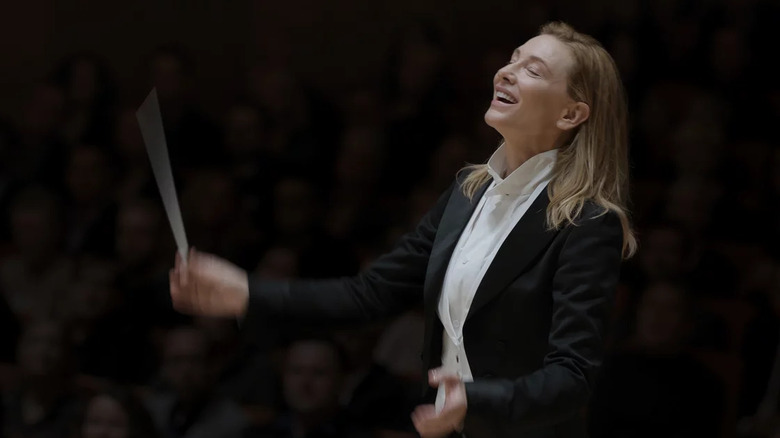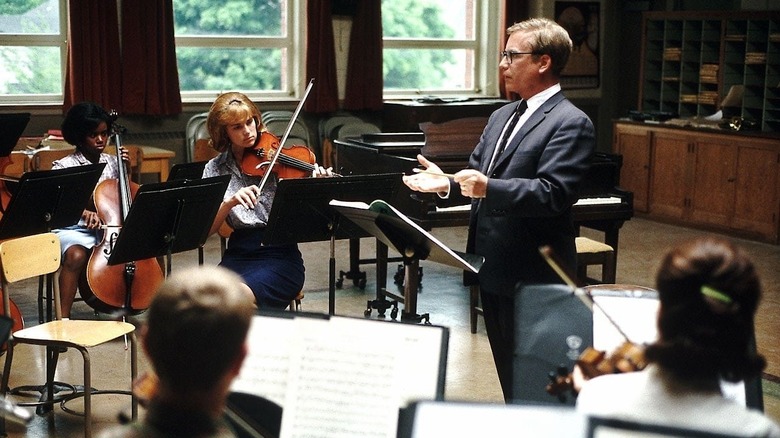Why The Academy Created An Oscar Category No One's Ever Won
The first Academy Awards ceremony was held on May 16, 1929, at the Hollywood Roosevelt Hotel in Hollywood, California. At the time, there were 12 categories, some of them separated by genre. Rather than just having a single Best Picture category, there was an award for Outstanding Picture and one for Best Unique and Artistic picture. William Wellman's "Wings" won Outstanding Picture, and many consider that film to be the 1929 equivalent of Best Picture. Artistic Picture, however, went to F.W. Murnau's "Sunrise: A Song of Two Humans," and that one ought to historically count at least as much as "Wings."
The first Oscars also had two directing categories (one for comedies and one for dramas), and three writing categories (for original screenplays, adapted screenplays, and title writing). A lot has changed in the last 95 years of Oscar history.
No category has undergone more name changes and alterations, however, than that of Best Original Score. There are so many ways to define and categorize non-diegetic movie music, that the Academy has tripped over their own feet trying to keep up. For many years, the Academy had separated Scoring categories for musicals and non-musicals, and sometimes they would distinguish between adapted scores (taken from stage productions, for instance) and wholly original scores.
This was because of Hollywood's hot-and-cold-running relationship with musicals. Live-action musicals were more common in the 1930s and 1940s, and the Academy wanted to award films accordingly. As musicals became less common, however, certain categories couldn't be filled, requiring the Academy to pivot by either renaming a category, or simply dropping one altogether.
In 2000, the Academy started a category called Best Original Musical, meant to replace the then-retired Best Original Musical or Comedy Score category. Because the Academy's eligibility requirements for modern musicals are so strict, however, no films have been nominated in the category for 25 years.
The eligbility requirements have been too strict to nominate anything for the Best Original Musical category
To lay them out, according to the Academy's own website, the requirements to be nominated for Best Original Musical are very specific.
"An original musical consists of not fewer than five original songs by the same writer or team of writers, either used as voiceovers or visually performed. Each of these songs must be substantively rendered, clearly audible, intelligible, and must further the storyline of the motion picture. An arbitrary group of songs unessential to the storyline will not be considered eligible."
It's the "must further the storyline" part that seems to be the biggest sticking point for any potential nominees. Even in big-budget animated musicals, some of the musical numbers are just to establish tone or further explore a character's motivation; they don't necessarily advance the plot.
This rule is especially odd, given the history of musical theater. Rodgers and Hammerstein's "Oklahoma!" debuted in 1946, and many scholars point to the show as the very first fully-integrated musical, that is: the musical numbers are fully integrated into the plot. Prior to "Oklahoma!," most musicals were revue-style shows, wherein the plot would take a brief intermission so an unrelated song-and-dance number could take place. Other scholars have pointed to 1927's "Show Boat" as the first musical to integrate songs into its story, of course, but the point stands: the idea of using songs to advance the plot is, in the broad history of theater, a relative novelty. The "Oklahoma!" movie, incidentally, was also a huge hit.
Because of this, however, there haven't been enough movies in any given year that meet the requirements to activate the Best Original Musical category. Giant hit films like "Chicago" aren't original, while animated giants like "Frozen" never have enough peers to share the category with.
So "Wicked, Part I," because it's an adaptation, isn't eligible. "Joker: Folie à Deux" doesn't have original songs. "Moana 2" qualifies ... but find me two-to-four others this year.
The wild and hairy history of Best Original Score name changes
Despite a history replete with musicals, the Academy has long seemed at a loss as to how to categorize them.
Starting in 1935, the Academy gave out an Oscar for Best Scoring. There was a mild scandal in 1938, however, when the winner of Best Scoring was Harry Koster's light-hearted comedy "One Hundred Men and a Girl," which made use of only pre-existing classical music for its score. Feeling that was unfair, the Academy added Best Original Score in 1939.
It seems as if this would be enough, but the Academy was not content. In 1942, the organization re-jiggered the categories slightly to incorporate musicians who write background music for non-musical dramas, and for those who write scores for musicals. The former would be awarded in the Best Music Score of a Dramatic Picture and Best Scoring of a Musical Picture. Because of the Byzantine eligibility requirements for those categories, though, only one of the two was activated in 1958 (which only had Best Scoring), and 1981 & 1982 (which, by then, only had the Best Original Score category). Clear as mud.
Over the years, Best Original Score has alternately been called "Best Music Score of a Dramatic or Comedy Picture," "Best Music Score — substantially original," "Best Original Score — for a motion picture [not a musical]," and "Best Original Dramatic Score." It's been called "Best Original Score" since 2000. Yes, eligibility requirements are still strict; remember when "Arrival" wasn't eligible?
Meanwhile, "Best Scoring of a Musical Picture" has gone through the moniker alterations of "Best Scoring of Music — adaptation or treatment," "Best Original Song Score," "Best Scoring: Original Song Score and Adaptation or Scoring: Adaptation," "Best Original Song Score and Its Adaptation or Adaptation Score," and "Best Original Musical or Comedy Score." The final title was used from 1996 to 1999. It hasn't been employed since. Best Original Musical was supposed to take its place.
But, as stated, no one has been nominated yet.


